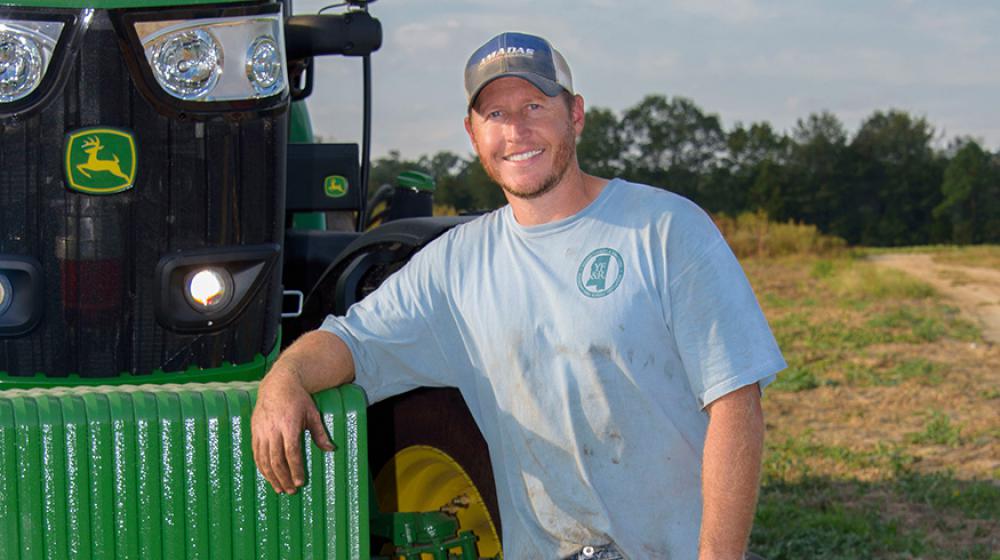From the Ground Up

Billy Tabb, farmer
Eupora producer earns national award
Billy Tabb got a reality check in 2003 when he told his father he wanted to farm.
“My dad is a lifelong farmer, so I was hoping he would help me get started. He told me to go to the FSA office and get a loan,” Tabb recalls. “When I got there, the lender gave me a stack of papers as thick as the Bible and wished me good luck.”
The loan to rent his father’s land through the U.S. Department of Agriculture’s Farm Service Agency was $83,000. That’s compared to the $1.2 million it took to plant his crop this year.
Thirteen years in, Old Walthall Farms in Eupora has grown from 185 acres to 2,600, and Tabb and his wife, Cala, received the American Farm Bureau Federation’s national Young Farmers and Ranchers Achievement award.
“It’s unbelievable what Farm Bureau does for our producers, and I didn’t get to see it firsthand until I became a member,” Tabb says. “I think what set me apart for the award was how diversified we are now, compared to when I started. I told the committee my story and told them farming is all I ever wanted to do. Cala and I were humbled and blessed to be recognized on the national level.”
Tabb started with cotton and soybeans before he advanced to “growing a little bit of everything now.” He has steered recent efforts toward peanuts, milo, wheat, corn, and produce.
The produce component is another revenue stream, but it is also Tabb’s way of paying his knowledge forward. That knowledge came from the Mississippi State University Extension Service, which he credits with a major role in the farm’s success.
Each February, Tabb buys watermelon and tomato seeds and turns them over to the Webster County Schools Forest and Agriculture Department. Vocational technical students there grow the plants in a greenhouse through the spring. Tabb buys the plants back when the school year ends and transplants them.
Those students come back to Tabb’s farm later in the summer to watch the harvest.
“I don’t think it’s a big deal to take time out with kids, let them come to the farm, and make their own contribution,” he explains. “So many people with Extension help me any way they can, so I want to pass that on to young people who are interested in agriculture.”
Tabb likens the resources Extension offers to a personalized, human search engine.
“We’ve all gotten used to people telling us to Google something we want to find out. I’ve had my own Google with the Extension Service since the day I started,” Tabb says. “If I can’t identify an insect Extension MATTERS 7 FROM THE GROUND UP Eupora Producer Earns National Award in my field or figure out why leaves are falling off cotton in the middle of the growing season, I have an expert available at any time to answer my questions. They always have the answers and it doesn’t cost anything, so Extension is a useful tool that you’re missing out on if you don’t take advantage of it.”
Tabb singles out Webster County Extension agent Lisa Stewart and MSU regional Extension specialist Dr. Dennis Reginelli for working with him since his early days.
“Years ago, Lisa and Dennis taught me how to check my crops for pests and identify thresholds so I could decide when I needed to use an insecticide and when spraying would be excessive,” he says. “Knowing those thresholds is very important because, if you spray an entire field after only finding an isolated case or two of insect pressure, you could hurt the beneficial insects and spend more money than you should.”
Another tool Tabb has used to his benefit is the crop variety demonstration plots Reginelli has grown on his land for the last decade. As a producer-cooperator, Tabb has learned from demonstration results which varieties are best suited for his land.
“Our soil is not the best in the world,” he admits, “so varieties that grow well in the Midwest or the Delta don’t grow as well here. Dennis is helping me find varieties that will grow here and generate a profit. He is a jack-of-all-trades, and I’ve called him for advice on pretty much everything.”
One of Reginelli’s suggestions just might have saved Tabb’s soybean crop in 2011. He suggested that Tabb use paraquat on the crop to speed its harvest and avoid potential damage from the remnants of Tropical Storm Lee.
But another piece of advice may be even more memorable:
“I was growing okra and called Dennis to tell him it wasn’t producing like I had hoped,” Tabb recalls. “He told me to beat some of the leaves off of the plants with a stick. I thought that sounded strange, but I did it and the yields improved significantly.”
Reginelli says Tabb’s willingness to learn is key to his continued growth as a producer.
“When you’ve got a young person interested in farming, you want to put a lot of effort into helping him,” he says. “We’ve worked on numerous demonstration plots using his land and gotten a lot of quality data because he believes in communicating with us as a team. Those data are going to be shared, not only in his community, but across the state to help producers see what changes they can make to get the results they are looking for.
“I appreciate his dedication to us and to the success of his peers,” Reginelli adds. “I’ve seen him start as a young man and grow into a great producer with a beautiful family. It’s been a privilege to watch his success.”


